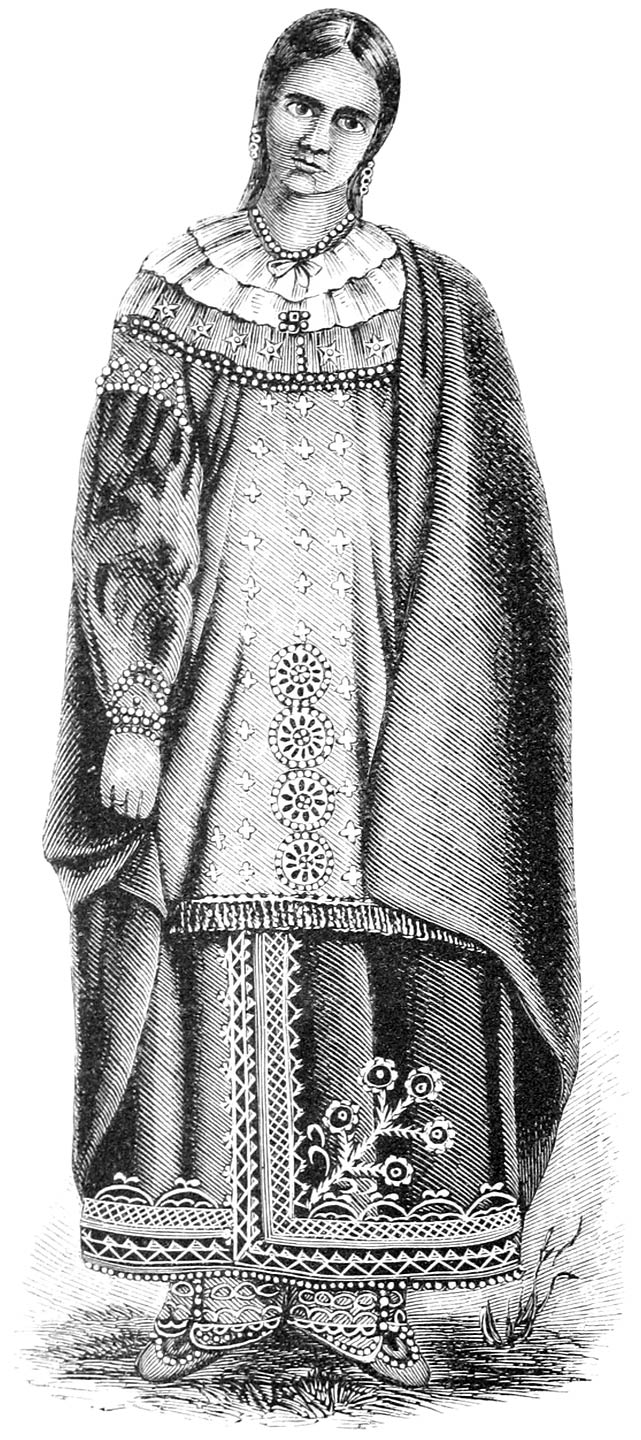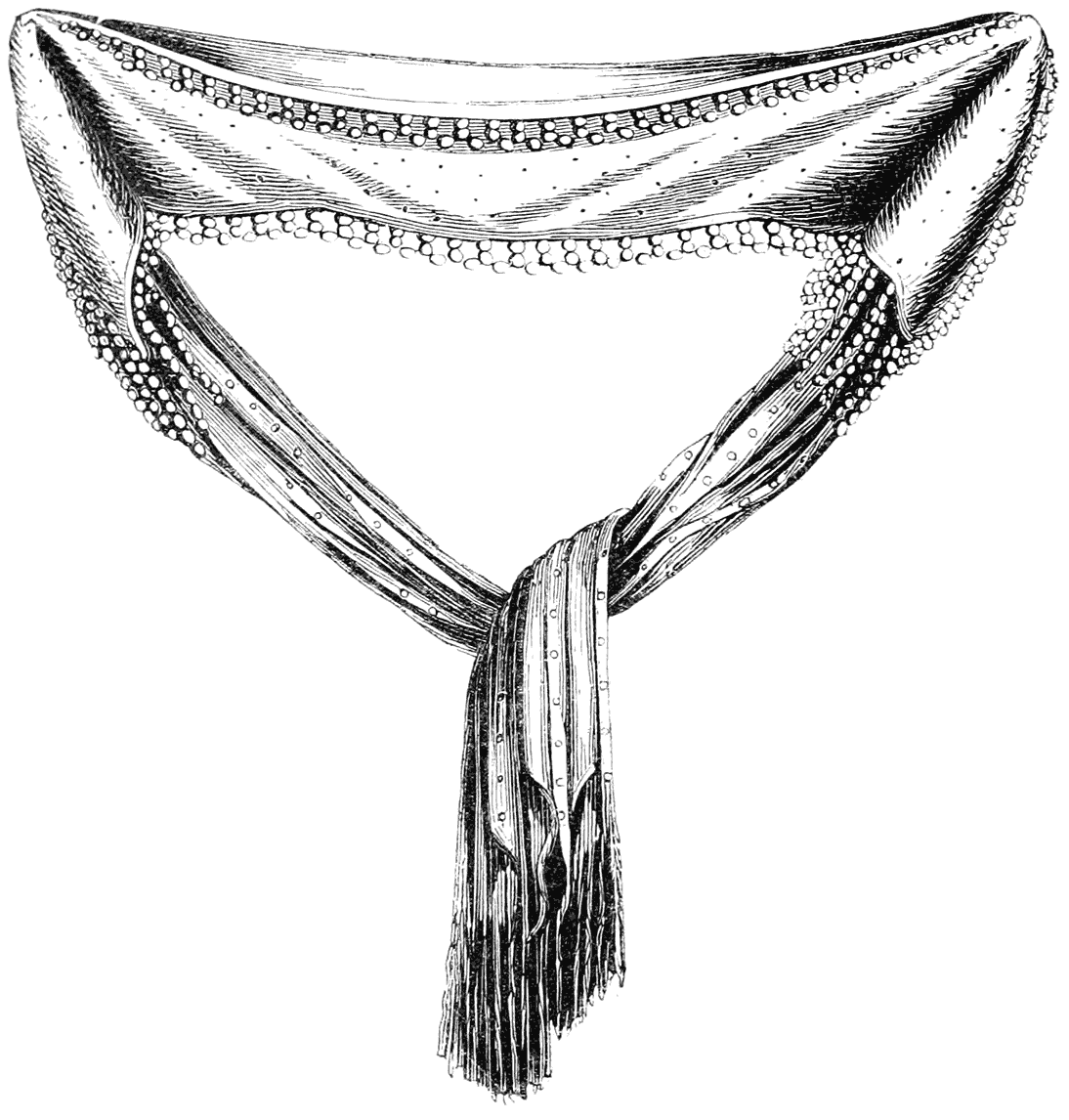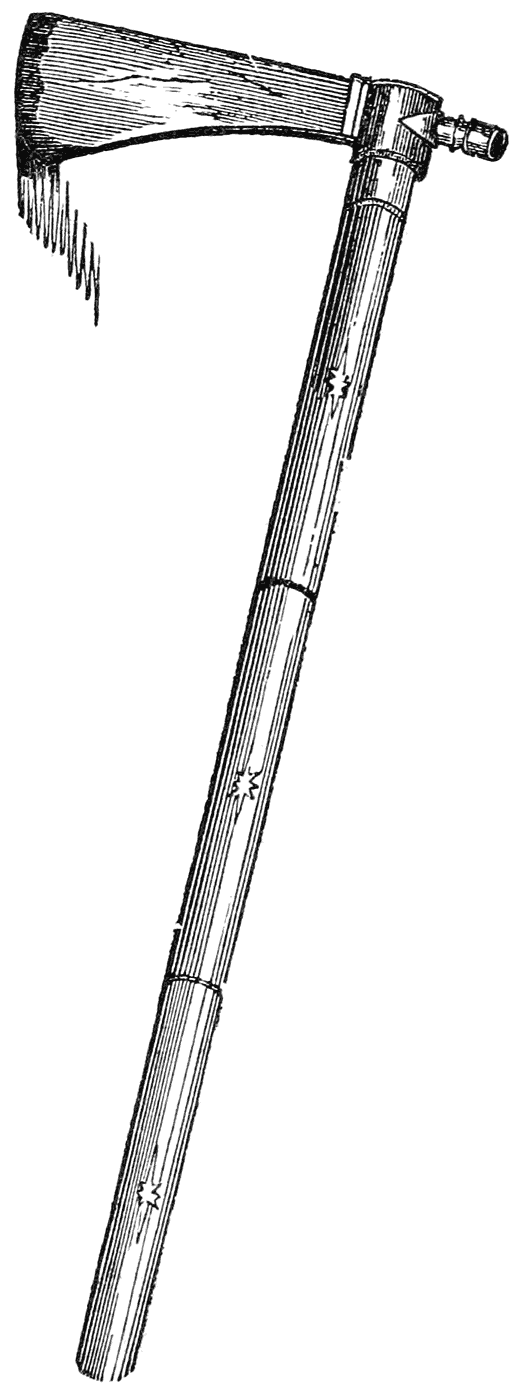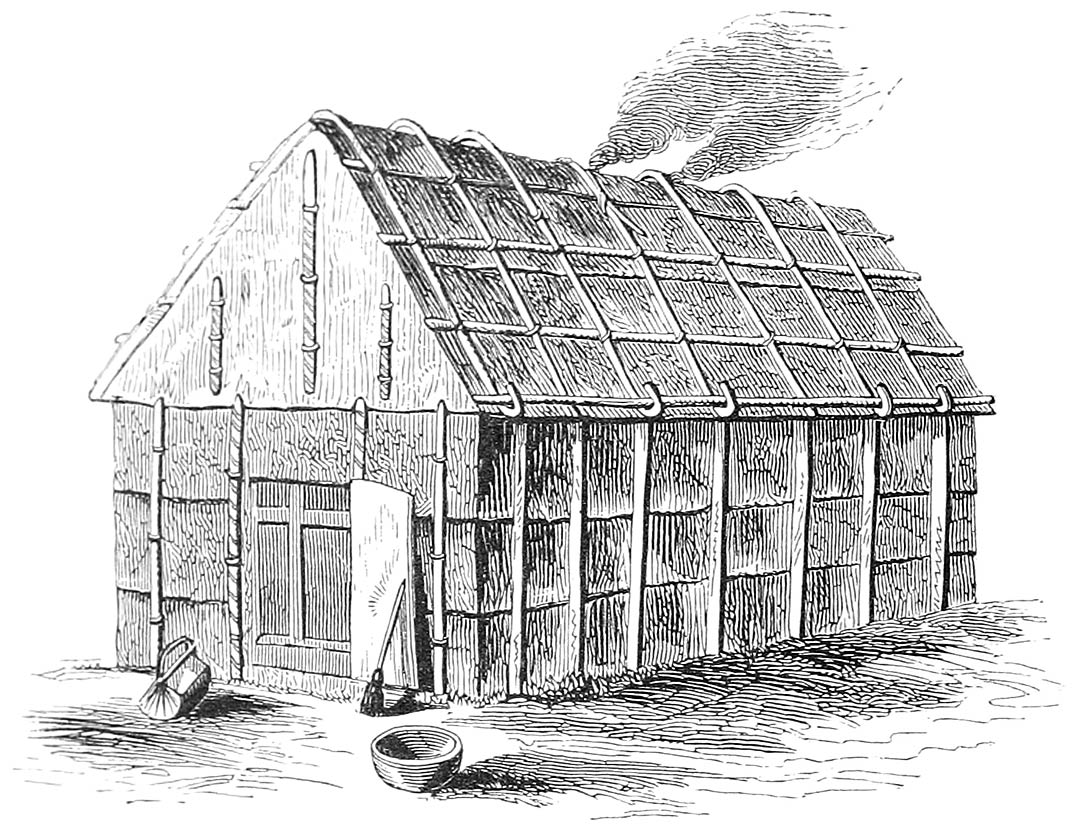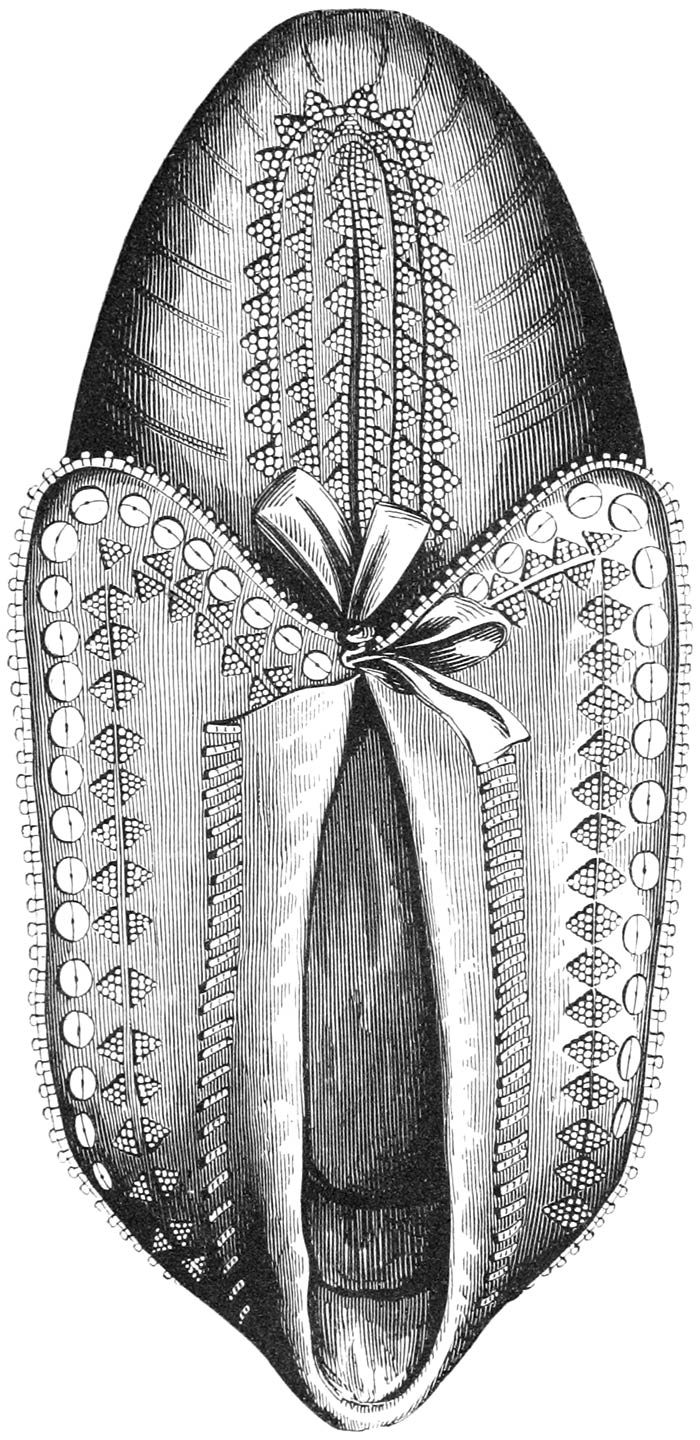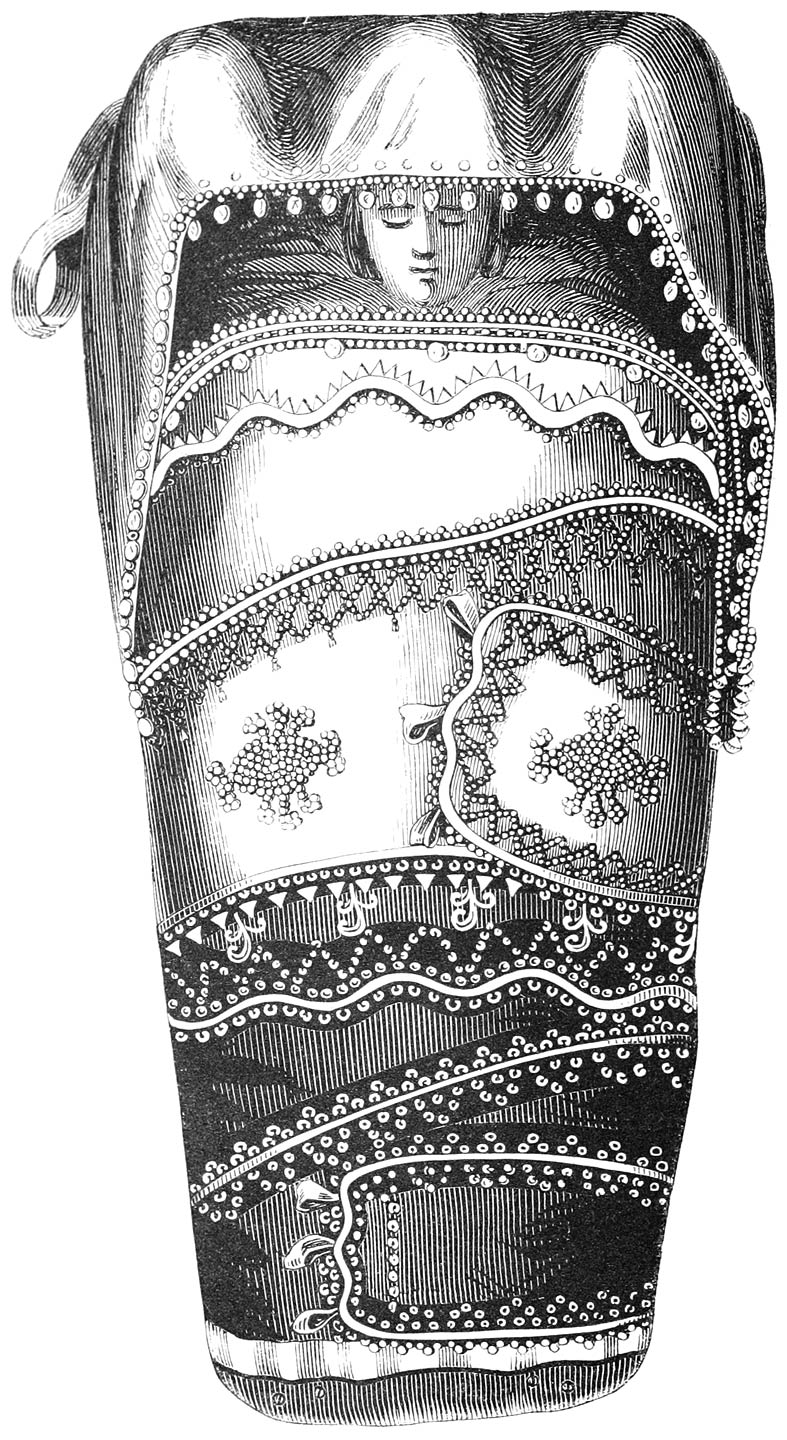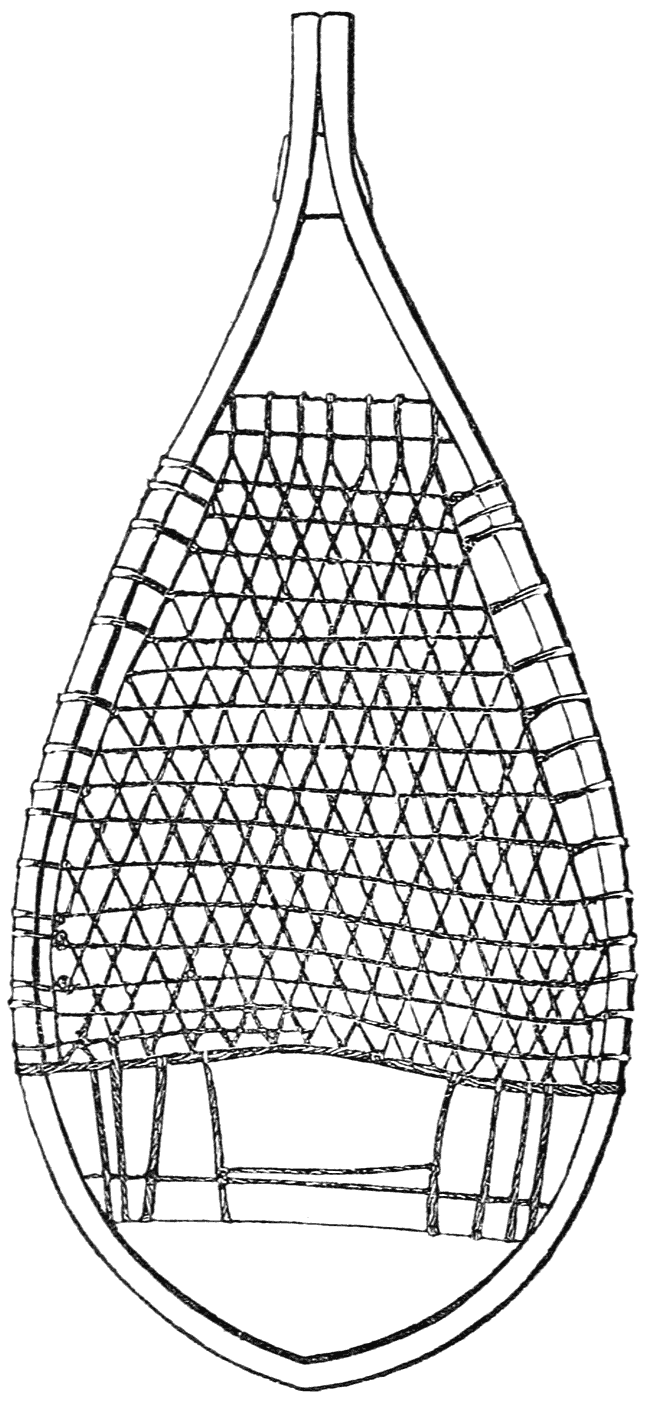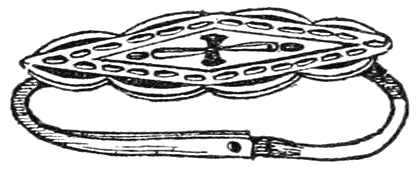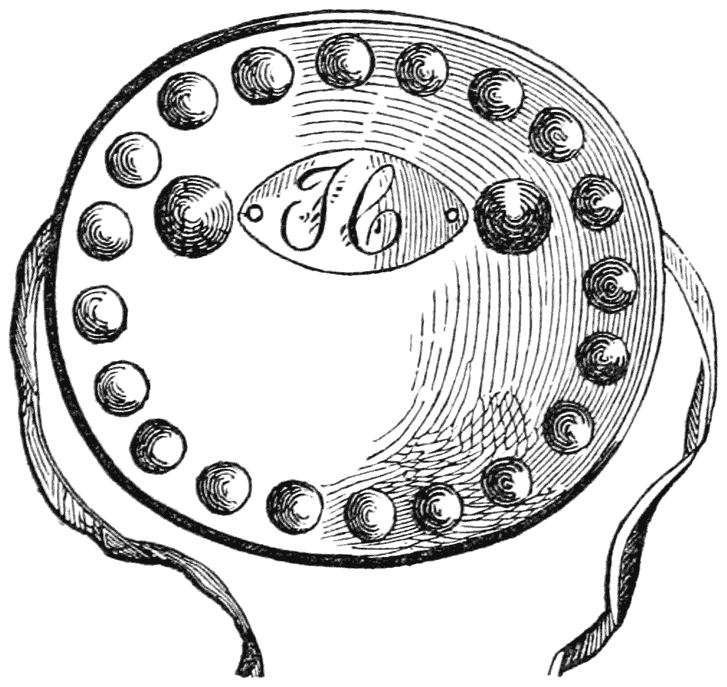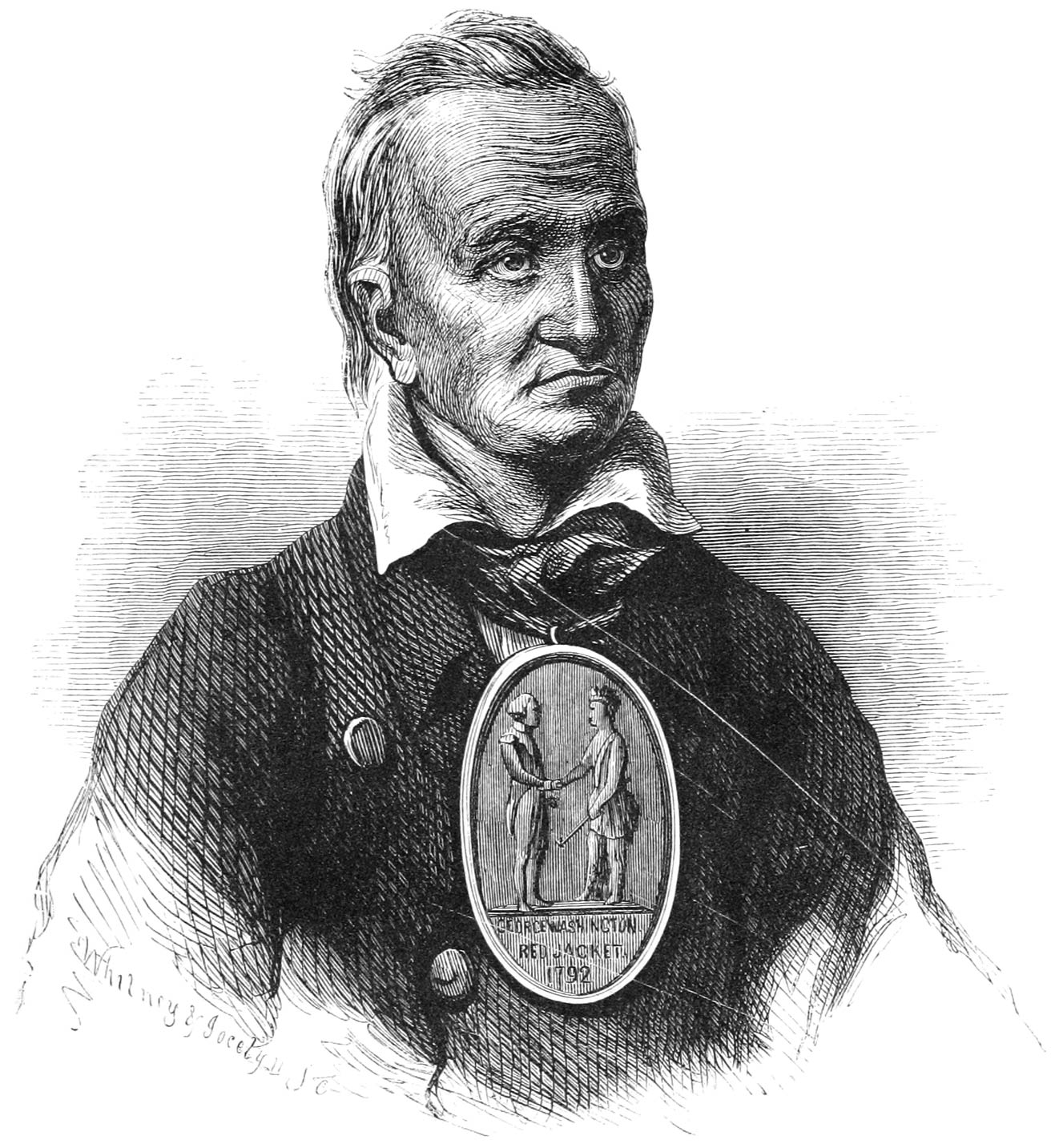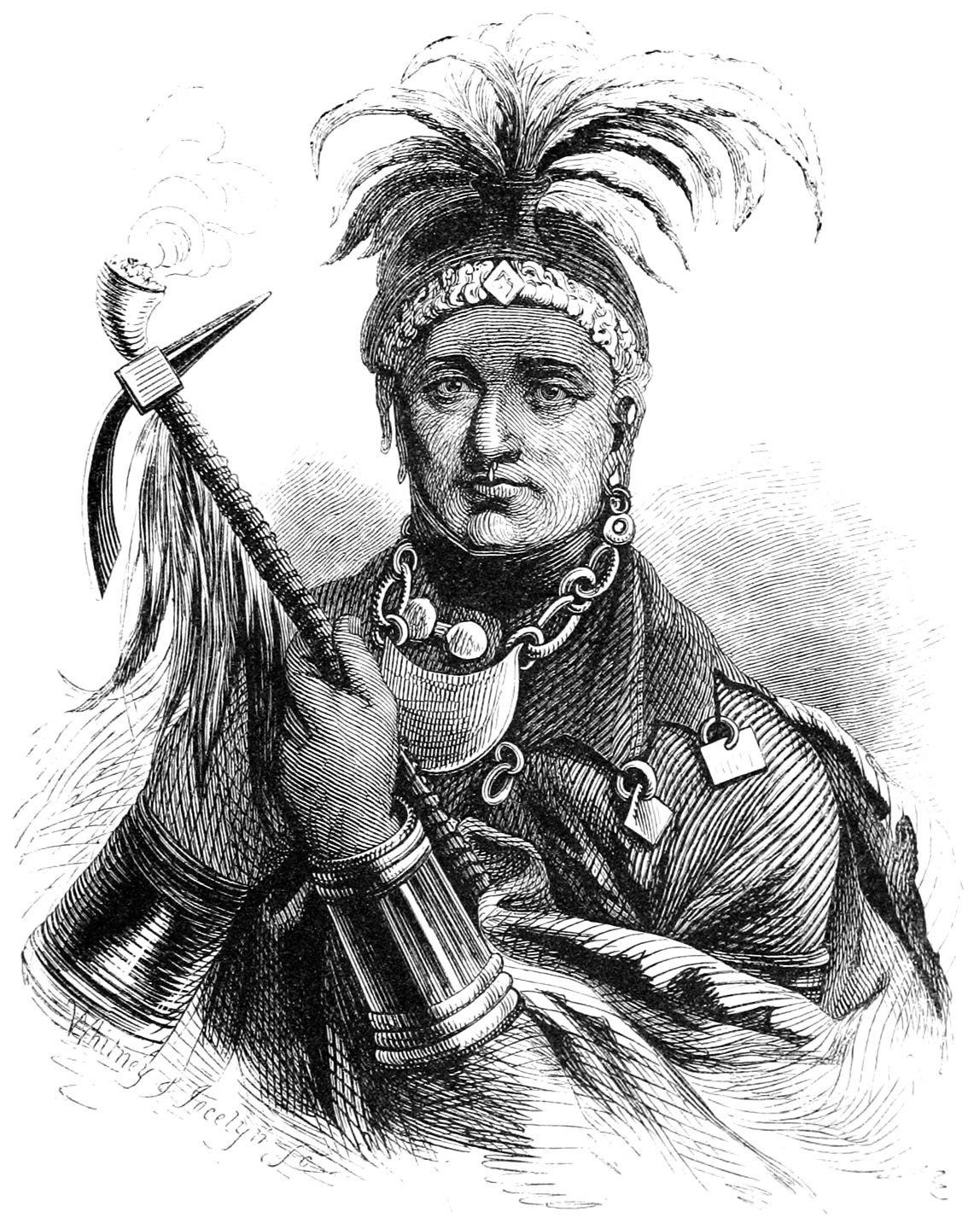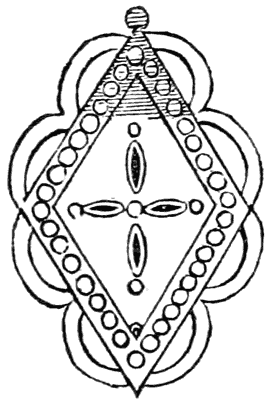An interesting interview is related in Mr. Stone’s Life of Red Jacket, as having taken
place between Rev. Dr. Breckenbridge and the great Indian orator, and I transfer it,
as given by this author, in the words of him who wrote it:
“The first opportunity I ever enjoyed of seeing that deservedly celebrated Indian
Chief, Red Jacket, was in the year 1821, at the residence of General Porter, Black
Rock, New York. Being on a visit to the General and his family, it seemed a peculiarly
fit occasion to become acquainted with the great Seneca orator, whose tribe resided
within a few miles of Black Rock. General Porter embraced the Indian warriors who
fought with us on that line during the late war with Great Britain in his command.
From this cause—from his high character—his intimate acquaintance with the Chiefs,
and his known attachment to those interesting people, he had great influence over
them; and his lamented lady, who, it is not indelicate for me to say, was my sister,
had by her kindness won the rugged hearts of all their leading men. So that their
united influence, and my near relationship to them, secured to me at once access to
the Chiefs and their entire confidence.
[175]
“I had not only a great desire to see Red Jacket, but also to use this important opportunity
to correct some of his false impressions in regard to Christianity and the missionaries
established in his tribe. To this end it was agreed to invite Red Jacket and the other
Chiefs of the Senecas to visit Co-na-shus-tah, and meet his brother at his house.
The invitation was accordingly given, and very promptly and respectfully accepted.
“On the appointed day they made their appearance in due form, headed by Red Jacket,
to the number of eight or ten besides himself. He wore a blue dress, the upper garment
cut after the fashion of a hunting-shirt, with blue leggins, a red jacket, and a girdle
of red about his waist. I have seldom seen a more dignified or noble looking body
of men than the entire group. It seems—though no such impression was designed to be
conveyed by the terms of the invitation—that some indefinite expectation had been
excited in their minds of meeting an official agent on important business. And they
have been so unworthily tampered with, and so badly treated by us, as a people, and
many of their most important treaties have been so much the result of private and
corrupting appeals, that they very naturally looked for some evil design in every
approach to them, however open and simple it may be. So it was on this occasion. As
soon as the ceremonies of introduction were over, with the civilities growing out
of it, the old orator seated himself in the midst of the circle of Chiefs, and after
a word with them, followed by a general assent, he proceeded in a very serious and
commanding manner—always speaking in his own nervous tongue, through an interpreter—to
address me, in substance, as follows:
“ ‘We had a call from our good friends (pointing to the General and his lady), to
come down to Black Rock [176]to meet their brothers. We are glad to break bread and drink the cup of friendship
with them. They are great friends to our people, and we love them very much. Co-na-shus-tah
is a great man, and his woman has none like her. We often come to their house. We
thank them for telling us to come to-day. But as all the Chiefs were asked, we expected
some important talk. Now here we are, what is your business?’
“This, as may readily be supposed, was an embarrassing position to a young man just
out of college. I paused. Every countenance was fixed upon me, while Red Jacket in
particular seemed to search me with his arrowy eye, and to feel that the private and
informal nature of the meeting, and the extreme youth of the man, were hardly in keeping
with the character and number of the guests invited; and his whole manner implied,
‘that but for the sake of the General and his good friends, I should have waited for
you to come to me.’ With these impressions of his feelings, I proceeded to say, in
reply:
“ ‘That I should have thought it very presumptuous in me to send for him alone—and
still more, for all the Chiefs of his tribe—to come so far to see me; that my intention
had been to visit him and the other Chiefs at his town; but the General and his lady
could not go with me to introduce me; nor were we at all certain that we should find
him and the other Chiefs at home; at any rate, the General’s house was most convenient.
That as to myself, I was a young man, and had no business with them, except that I
had heard a great deal of Red Jacket, and wished to see him and hear him talk; and
that I would return his visit, and show him that it was not out of disrespect, but
out of regard for him, and great desire to see him, that we had sent for him—this
being the way the white men honor one another.’
[177]
“Mrs. Porter immediately confirmed what I had said, and gave special point to the
hospitality of the house, and the great desire I had to see Red Jacket. Her appeal,
added to the reply, relaxed the rigor of his manner and that of the other Chiefs,
while it relieved our interview of all painful feelings.
“After this general letting down of the scene, Red Jacket turned to me familiarly
and asked: ‘What are you? You say you are not a government agent; are you a gambler
(meaning a land speculator), or a black-coat—or what are you?’
“I answered, ‘I am yet too young a man to engage in any profession; but I hope some
of these days to be a black-coat.’
“He lifted up his hands, accompanied by his eyes, in a most expressive way; and though
not a word was uttered, every one fully understood that he very distinctly expressed
the sentiment, ‘What a fool!’ But I had been too often called to bear from those reported
‘great and wise’ among white men, the shame of the cross, to be surprised by his manner; and I was too anxious
to conciliate his good feelings to attempt any retort. So that I commanded my countenance,
and seeming not to have observed him, I proceeded to tell him something of our Colleges
and other institutions.
“A good deal of general conversation ensued, addressed to one and another of the Chiefs,
and we were just arriving at the hour of dinner, when our conference was suddenly
broken up by the arrival of a breathless messenger, saying that an old Chief, whose
name I forget, had just died, and the other Chiefs were immediately needed to attend
his burial. One of the Chiefs shed tears at the news; all seemed serious, but the
others suppressed their feelings, and spent a few moments in a very [178]earnest conversation, the result of which Red Jacket announced to us. They had determined
to return at once to their village, but consented to leave Red Jacket and his interpreter.
In vain were they urged to wait till after dinner, or to refresh themselves with something
to eat by the way. With hurried farewell and quick steps they left the house, and
by the nearest foot-path returned home.
“This occurrence relieved me of one difficulty: it enabled me to see Red Jacket at
leisure alone. It seemed, also, to soften his feelings, and make him more affable
and kind.
“Soon after the departure of the Chiefs, we were ushered to dinner. Red Jacket behaved
with great propriety in all respects; while his interpreter, though half a white man,
after a few awkward attempts at the knife and fork, found himself falling behind;
and repeating the adage, which is often quoted to cover the same style among our white
urchins, of picking a chicken bone, ‘that fingers were made before forks,’ he proceeded with real gusto and much good humor to make up his lost time upon
all parts of his dinner. It being over, I invited Red Jacket into the General’s office,
where we had four hours’ most interesting conversation on a variety of topics, but
chiefly connected with Christianity, the government of the United States, the missionaries,
and his loved lands.”
It was during this interview that the objects of speculators were so explained to
him, that he understood their evil designs; and the true nature of the missionary
enterprise was made clear to his comprehension, so that his enmity was never afterward
so bitter.
When assured that by the course he was pursuing, he was doing more than any one else
to break up and drive [179]away his people, and that the effect of the teachings of the missionaries was to preserve
them, he grasped the hand of the speaker and said: “If this is so, it is new to me,
and I will lay it up in my mind (pointing to his noble forehead), and talk of it to
the Chiefs and the people.”
Dr. B. continues: “Red Jacket was about sixty years old at this time, and had a weather-beaten
look, which age, and more than all, intemperance had produced; but his general appearance
was striking, and his face noble. His lofty and capacious forehead, his piercing black
eye, his gently curved lips, fine cheek and slightly aquiline nose—all marked a great
man; and as sustained and expressed by his dignified air, made a deep impression on
all who saw him. All these features became doubly expressive, when his mind and body
were set in motion by the effort of speaking—if effort that may be called which flowed
like a stream from his lips. I saw him in the wane of life, and heard him only in
private, and through a stupid and careless interpreter. Yet, notwithstanding these
disadvantages, he was one of the greatest and most eloquent orators I ever knew. His
cadence was measured, and yet very musical; and when excited, he would spring to his
feet, elevate his head, expand his arms, and utter with indescribable effect of manner
and tone, some of his noblest thoughts.”
General Porter speaks of him as a man endowed with great intellectual powers, and
who, as an orator, was not only unsurpassed, but unequalled by any of his contemporaries.
Although those who were ignorant of his language could not fully appreciate the force
and beauty of his speeches, when received through the medium of an interpreter,—generally
coarse and clumsy,—yet such was the peculiar gracefulness of his person, attitudes
and action, [180]and the mellow tones of his Seneca dialect, and such the astonishing effects produced
on that part of the auditory who did fully understand him, and whose souls appeared
to be engrossed and borne away by the orator, that he was listened to by all with
perfect delight. His figures were frequently so sublime, so apposite and so beautiful,
that the interpreter often said the English language was not rich enough to allow
of doing him justice.
Another gentleman says: “It is evident that the best translations of Indian speeches
must fail to express the beauty and sublimity of the originals—especially of such
an original as Red Jacket. It has been my good fortune to hear him a few times, but
only in late years, when his powers were enfeebled by age and intemperance; but I
shall never forget the impression made on me the first time I saw him in council.
The English language has no figures to convey the true meaning of the original, but
though coming through the medium of an illiterate interpreter, I saw the dismembered
parts of a splendid oration.”
On one occasion he used the following figurative language in speaking of the encroachments
of the white people:
“We first knew you a feeble plant, which wanted a little earth whereon to grow. We
gave it you; and afterward, when we could have trod you under our feet, we watered
and protected you; and now you have grown to be a mighty tree, whose top reaches the
clouds, and whose branches overspread the whole land, whilst we, who were the tall
pine of the forest, have become a feeble plant, and need your protection.
“When you first came here, you clung around our knee and called us father; we took you by the hand and called you brothers. You have grown greater than we,
so [181]that we can no longer reach up to your hand; but we wish to cling around your knee,
and be called your children.”
Of the domestic character and habits of the great Indian orator, we of course know
very little. It has not been the custom of civilized or Christian people to relate
this portion of the life of any who became eminent among them, and we have no means
of learning much concerning the home life of Indians.
We know that Red Jacket separated from his first wife after she had become the mother
of several children, and that her infidelity was the alleged cause. The repugnance
which he ever afterwards manifested towards her, is in accordance with his known moral
purity of character.
That he had a father’s love for his children, we may see in the following beautiful
language which he used in answer to a lady, who inquired if he had any living, as
she knew that several had been taken away.
Fixing his eyes upon her with a mournful expression of countenance, he replied:
“Red Jacket was once a great man, and in favor with the Great Spirit. He was a lofty
pine among the smaller trees of the forest. But after years of glory, he degraded
himself by drinking the fire-water of the white man. The Great Spirit has looked upon
him in anger, and his lightning has stripped the pine of its branches.”
Had he hated the white men sufficiently to resist their temptations, he might have
been the glory and the saviour of his people. The word which in Seneca is used to
express strong drink, very truly and emphatically describes it as the mind destroyer. This was its office, and if the noble mind of Red Jacket had not been destroyed
by its agency, he would have seen clearly through the dark plots [182]of his enemies, and been able to counter-plot to their destruction, and thus rescued
his people from the grasp of their pursuers. His fall is often quoted as a proof of
the weak and vicious propensities of the race, which it is useless to attempt to place
on a level with the Anglo-Saxon.
It may be necessary to concede that the Saxon is superior to all others, inasmuch
as all the others fall back and waste away before it. But this superiority will not
entitle them to claim for themselves more virtues than many others can boast. I know
it is customary for us to pride ourselves upon our success as conquerors and destroyers,
but yet it is lamentable that our national traits are far from being Christian ones.
It is by making use of cruel and revolting means, that we obliterate the traces of
whole nations and blot out kingdoms, as water obliterates blood. A nation of Christians, of whatever name, could not thus conquer and destroy. If only the warrior had been
cut off, and the tomahawk and scalping-knife buried, the pages of Indian history would
not be so dark. But they are stained with something worse than blood. They are reeking
with the slime of falsehood, avarice, treachery, drunkenness, and every species of
debauchery. When Indians adopt civilization, there is no greater proportion of the
whole number who become the slaves of vice, than takes place among white people.
Red Jacket became intemperate,—but how many of the members of every Senate and House
of Representatives, since the formation of our government, have become the same? How
many of the brightest names on our historic scroll would be blotted out, if only the
virtuous were allowed to remain?
I cannot learn that he was addicted to any other debasing vice.
As one of the proofs that the Indian had an intuitive [183]perception of propriety, may be related an incident which occurred whilst a gentleman
was travelling with a party of Indian Chiefs and their interpreter. Red Jacket was
one of the party, but he was uniformly grave. The others were much inclined to merriment,
and during an evening when they were gathered around the fire in a log cabin, the
mirth was so great and the conversation so jocular, that Red Jacket was afraid the
stranger, who could not understand their language, would think himself treated with
impoliteness, and infer that their sport was at his expense. He evidently enjoyed
their happiness, though he took no part; but after awhile he spoke to Mr. Parish,
the interpreter, and requested him to repeat a few words to Mr. Hospres, which were
as follows:
“We have been made uncomfortable by the storm; we are now warm and comfortable; it
has caused us to feel cheerful and merry; but I hope our friend who is travelling
with us, will not be hurt at this merriment, or suppose that we are taking advantage
of his ignorance of our language, to make him in any manner the subject of mirth.”
On being assured that no such suspicion could be entertained of the honorable men
who were present, they resumed their mirth and Red Jacket his gravity.
When Lafayette was an officer in the Revolutionary army, he met Red Jacket at the
treaty of peace at Fort Stanwix, in 1787, where the Indian orator eloquently opposed
“burying the tomahawk.” When he again visited this country, in 1825, they met at Buffalo,
and General Lafayette remarked, that time had wrought great changes upon both since
their first meeting. “But,” rejoined Red Jacket, “he has not been so severe with you
as with me. He has left you a fresh countenance, and hair to cover your head; while
to me——behold!” and taking [184]the covering from his head, he disclosed that he was nearly bald. But Lafayette did
not leave him to think thus harshly of time, but proved to him that the ravages had
been nearly the same upon both, by removing a wig and exposing a head almost as bald
as the Chief’s; upon which he remarked with much pleasantry, that a scalp from some
bystander would renew his youth in the same manner!
A young French nobleman visited Buffalo a few years before this, and having heard
much of the fame of Red Jacket, sent him word that he wished to see him, inviting
him to come the next day. Red Jacket received the message, and affected great contempt,
saying, “Tell the young man if he wishes to visit the old Chief, he will find him with his nation, where other
strangers pay their respects to him, and Red Jacket will be glad to see him.” The
Count sent back word that he had taken a long journey and was fatigued; that he had
come all the way from France to see the great orator of the Seneca nation, and hoped
he would not refuse to meet him at Buffalo.
“Tell him,” said the sarcastic Chief, “that having come so far to see me, it is strange
he should stop within seven miles of my lodge.”
So the young Frenchman was obliged to seek him in his wigwam; after which he consented
to dine with the Count, at Buffalo, and was pronounced by him a greater wonder than
Niagara itself.
On one occasion he was visited by a gentleman who talked incessantly, and to little
purpose, and who would go very near the person he was addressing, and chatter about
as intelligibly as a magpie. Red Jacket, receiving the message that a stranger wished
to see him, dressed himself with great care, and came forth in all his dignity. One
glance was sufficient to his keen eye to understand the character of his guest; and
listening a few moments [185]with contempt in all his features, he went close to him and exclaimed, “Cha! cha!
cha!” as fast as he could speak, and turned on his heel towards his own cabin “as
straight as an Indian,” nor deigned to look behind him while in sight of the house
tenanted by the gentleman, who stood for once speechless!
His vanity was very conspicuous. He was fully aware of his importance, and disposed
to make others aware of it on every possible occasion. Colonel Pickering was often
employed by the government to negotiate treaties, and would take down the speeches
on the occasion in writing. At one time, when Red Jacket was the orator, he thought he would note
the words of the interpreter whilst the Chief was himself speaking. He immediately
paused, and on being requested to proceed said, “No, not whilst you hold down your
head.”
“Why can you not speak whilst I write?”
“Because, if you look me in the eye, you will know whether I tell you the truth.”
At another time, he turned his head to speak to a third person, when Red Jacket very
haughtily rebuked him, saying, “When a Seneca speaks, he ought to be listened to with
attention, from one end of this great island to the other.”
When he returned from Philadelphia, he was in the habit of using his oratorical powers
to embellish the manner of his reception, and would collect around him the Chiefs
and people of his nation, and, dressed in his uniform, with the cocked hat under his
arm, would personify the President, and bow to all present as if they were the company
in the great saloon, imitating the manners and gestures of the original with true
grace and dignity, and then entertain his audience with the compliments and attentions
which had been bestowed upon him.
[186]
When invited to dine, or be present on any occasion of social festivity among white
people, he conformed with wonderful tact to the customs to which he was a stranger—never
manifesting any surprise or asking any questions, till he could consult some friend
whose ridicule he did not fear. It was after returning from Philadelphia, where he
had dined with General Washington, that he asked the following explanation.
He said a man stood behind his chair, and would, every now and then, run off with
his plate and knife and fork, and immediately return with others. “Now,” said Red
Jacket, “what was this for?” He was told that there was a variety of dishes on the
President’s table, and each was cooked in a different way, and for every new dish
the guests were helped to a new plate. “Oh,” said he, musing a moment, “is that it?
You must then suppose that the plates and knives and forks retain the taste of the
cookery?” On hearing the affirmative, he said, “But I should suppose the taste would
remain on the palate longer than on the plate.” That, he was told, they were in the
habit of washing away with wine. “Oh,” said he, “I now understand it. I thought, for
so general a custom, you must have some good reason, and now regret that I did not
know it when I was in Philadelphia; for the moment the man ran off with my plate,
I would have drank wine till he returned with the other—for though I am fond of eating,
I am more fond of drinking.”
We are accustomed to think the blanket of the Indian a sign of barbarity, and anything but dignified and graceful. Yet the toga of the Roman orator was never folded about his noble figure with more grace or dignity,
than the homely mantle of the Seneca Chief, when he arose to address an Indian audience.
The adjustment of his dress was always the signal by which it was known [187]that he was about to rise. A gentleman who knew him intimately for half a century,
says he was the most graceful public speaker he ever heard. His stature was above
the middle size; his eyes fine, and expressive of the intellect which gave them fire;
he was fluent, without being too rapid; and dignified and stately, without rigidity.
When he arose, he would turn towards the Indians, and ask their attention to what
he was about to say in behalf of the commissioner of the United States. He would then
turn towards the commissioner, and with a slight but dignified inclination of the
head, proceed. Decorum was at all times the characteristic of an Indian council. If
the orator omitted what was considered by any one present important to be dwelt upon,
he would place himself very near the speaker, and in a quiet and most delicate manner
whisper his suggestion. As they had no written documents, their memories were the
tablets on which were engraven all important events, and these were often more faithful
than the scrolls of the learned.
In a council which was held with the Senecas by General Tompkins, of New York, a discussion
arose concerning some point in a treaty made several years before. The agent stated
one thing, and the Indian Chief another, insisting that he was correct. He was answered
that it was written on paper, and must be so.
“The paper then tells a lie,” said the orator, “for I have it written here (placing
his hand upon his brow). You Yankees are born with a feather between your fingers,
but your paper does not speak the truth. The Indian keeps his knowledge here; this
is the book the Great Spirit has given him, and it does not lie.”
On consulting the documents more particularly, it was found that the Indian record
was, indeed, the most correct!
[188]
Although fond of good things, Red Jacket had a great contempt for the sensualist.
When speaking of an Indian, whose name was Hot bread, and who was known to be indolent and gluttonous, he exclaimed, “Waugh! big man here
(laying his hand upon his abdomen), but very small man here,” bringing the palm of
his hand with significant emphasis across his forehead.
That he shrank from spectacles of human suffering, may have been the reason of his
aversion to the war-path. He did not like to look on blood.
At one time, when three young men were to suffer death by hanging, and multitudes
were rushing towards the spot, he was met hurrying in an opposite direction. When
asked why he did not go to witness the execution, he answered, “Fools enough there
already; the battle-field is the place to see men die.” One would certainly think,
to witness the throngs which crowd around the gallows, that neither Christian nor
human feeling filled the breasts of civilized beings.
The efforts were for a long time fruitless to induce Red Jacket to sit for his portrait.
“When Red Jacket dies,” he would say, “all that belongs to him shall die too.” But
at length, an appeal to his vanity availed, and on being assured that his picture
was wanted to hang with those of Washington and Jefferson, and other great men in
the National Galleries, he consented; and having once broken his resolution, no longer
resisted, and was painted by several artists. The one by Weir is considered best,
and was taken during a visit of the Chief to New York, in 1828, at the request of
Dr. Francis. He dressed himself with great care in the costume he thought the most
becoming and appropriate, decorated with his brilliant war-dress, his tomahawk, and
Washington medal. He then seated himself in a large arm-chair [189]while around him groups of Indians were reclining upon the floor. He was more than
seventy years of age at the time, but tall, erect and firm, though with many of the
traces of time and dissipation upon his form and countenance. He manifested great
pleasure as the outlines of the picture were filled up, and especially when his favorite
medal came out in full relief; and when the picture was finished, started to his feet
and clasped the hand of the artist, exclaiming, “Good! good!”
One who knew him remarks, “That his characteristics are preserved to admiration, and
his majestic front exhibits an altitude surpassing every other I have ever seen of
the human skull.”
His early youth was spent in the beautiful valley of the Genesee; there were his favorite
hunting-grounds, and there his memory loved to linger. During the strife of wars,
and the more bitter strife of treaties, he had indulged very little in his favorite
pastime; and when a day of comparative quiet came, he, in company with a friend, took
his gun and went forth, in hopes to find a deer for the sport of his rifle. They had
gone but a little distance, when a clearing opened before them. With a contemptuous sneer, the old man turned aside and wandered
in another direction. In a little while he came to another, and looking over a fence,
he saw a white man holding a plough, which was turning up the earth in dark furrows
over a large field. Again he turned sadly away, and plunged deeper in the forest,
but soon another open field presented itself; and though he had been all his life
oppressed with the woes of his people, he now for the first time sat down and wept.
There was no longer any hope,—they had wasted away.
Red Jacket was decidedly aristocratic, and disposed to stand upon his dignity. No person who knew him [190]would venture upon familiarity with him, and he did not like to have his children
mingle freely with all whom they might meet in the streets. But he never considered
the manners and habits of living among white people as worthy of imitation; and after
chairs and tables were introduced by his wife into his own dwelling, he scorned to
use them, and took his meals, as in the olden time, sitting on the floor, or a rude
bench, cushioned with deer-skin. Yet he would not eat alone. Though he talked very
little, he liked to be surrounded by his family. His second wife was his favorite,
and he treated her with the most affectionate kindness, except in leaving free her
religion; and then he scarcely reproached her—only saying that in embracing it, she
was countenancing the wrongs committed upon her people, which he could not, and if
she persisted he should leave her; and knowing her affection for him, he probably
thought she would not hesitate between her husband and Christianity. When he found
she would not renounce her new faith, he departed and lived several months at Tonnewanda.
His enmity was evidently entirely political. He understood nothing of the real nature
of Christianity, and was not willing to learn any thing concerning it from those who
had been guilty of the grievous wrongs the red man had suffered, whenever those calling
themselves Christians had come among them.
But he was not happy separated from those he loved, and those he left were not happy
without him. He missed the caresses of the children, and especially the youngest daughter,
of whom he was very fond. She used to sit upon his knee, with her little arms around
his neck and her soft cheek resting upon his, and play with his silver locks. When
he was gone she mourned for him, [191]and gave her mother no rest till she promised to take her to where her father lived.
They went together; but the mother, with true womanly delicacy, entered not his dwelling,
and refused to see him. She was willing to gratify her children, and cultivated their
affection and respect for him who had deserted her, but she would not seek him.
The little girl, who is now a Christian woman, and herself told me the story, threw
her arms around her father’s neck, and kissed him; and he pressed her to his bosom,
weeping tears of joy, and perhaps of true sorrow and repentance, and told her he was
coming home; that he was sorry he had left her mother, and did not think her religion
had done her any harm. He said he had bought her some broadcloth and beads, and would
bring them when he came. When she left him he went with her to the door of the house
where her mother lodged, but did not enter, and with many sobs and tears she bade
him good-bye, and returned home.
In a little while he followed. He came into the house and humbly addressed his wife,
saying he had come back again to live with her, if she would receive him; that he
had done wrong, and was very sorry, and had been very unhappy. The injured wife did
not answer a word, but threw her shawl around her, and went to the missionary to ask
him if it would be right to receive him now, and what she should do. The missionary
told her it was best to welcome him kindly, and encourage him to stay, if he made
no opposition to her new mode of worship.
On hastening back, she, in a dignified manner, expressed her joy at seeing him, and
her unchanged regard; but said she could not consent to his remaining, unless he would
permit her to go to the Mission Church on Sunday, [192]and in no way interfere with her religious duties. To this he assented, saying he
knew she was a better woman than before she became a Christian, and he would never
again molest her.
The children were rejoiced at the reconciliation, and all were again happy. He never
violated his promise; and though he could not join the family in their mode of worship,
not a word of disapprobation, or a look of contempt, reminded them that he liked it
not.
And often on Sabbath morning, the old Chief would rise early and awake the daughters,
saying, “Come, it is Sunday, you know; get up and have the work all done, so as to
go to meeting with your mother; always go with your mother.” Before he left her, his
wife was obliged to steal away when he did not know it. She would have her house in
order, and her blanket ready somewhere outside the dwelling, and when the bell rang,
would go quietly out, take her blanket, and run. But now, when the bell rang for Sabbath,
or evening meeting, he said, “Go;” and though he disliked to be left alone, he murmured
not, and made himself as comfortable as he could till she returned. He had a great
respect for her, and knew she was worthy of his confidence.
Though so eloquent in the council-chamber, Red Jacket seldom opened his lips in the
wigwam. Among his own people he was not social, and never entered into familiar conversation
upon ordinary topics. He was always ready to discuss the affairs of the nation with
Chiefs or distinguished strangers, but was not given to story-telling, and seldom
entered the houses of his neighbors. All the latter years of his life, he was sad
on account of the woes the Indian had experienced, and the woes he predicted were
still in store for them. He would lie upon his couch for hours, with his hands crossed
upon his [193]breast, and seem in deep distraction, and wish no interruption.
When he had been drinking, he was sometimes merry and talked very silly; but gravity
was his prevailing mood,—though this is not the prevailing mood of Indians generally,
as some people imagine.
When he meditated a speech, he would often repeat it to himself, and sometimes rehearse
it to the interpreter, in order to be sure it would sound well. But his incapacity
for business, and his degeneracy in consequence of his intoxication, procured for
him the general dislike of his people. Many were beginning to see that the missionaries
were their real friends, and to understand the distinction between reality and pretension,
and wished Christianity to be encouraged. Red Jacket was constantly disturbing the
councils by his bitter opposition and sarcasms, and was so unrelenting, that there
seemed no hope of changing his opinions; and it finally began to be whispered, and
then boldly proposed, that he should no longer be numbered among the Chiefs of the
nation. A council was called, and formal resolutions drawn up, declaring the reasons
why he was not fit for his office, and signed by twenty-six Chiefs. When it became
known to him, he was greatly grieved, and resolved not to submit to such an indignity.
Arousing his slumbering energies, he made a journey to Washington, to talk with the
President. He called on Colonel McKenney, who was in charge of the Bureau of Indian
Affairs; and as he had been informed by agents of all that had transpired among the
Senecas, he recapitulated the state of affairs, and advised the Chief to return, and
endeavor better to understand the nature of the missionary work; and, at least, to
allow those who differed from him in opinion, the same liberty he demanded for himself—those
who preferred to [194]be Pagans, could remain so; and those who wished to change, should have the privilege.
The old man listened with the deepest attention till the speaker had finished, and
then said, pointing to him and then in the direction of his people: “Our father has
got a long eye.” He endeavored to justify himself, and poured forth volumes of epithets
upon the “black-coats,” whose professions of disinterestedness he could not understand.
But on returning home, he became more quiet, and seemed convinced of the policy, if
not of the justice, of the advice he had received, and commenced in earnest to retrieve
his position. “It shall not be said of me,” thought he, as the fire of his youth again
kindled his eye—“It shall not be said that Sa-go-ye-wat-ha lived in insignificance,
and died in dishonor. Am I too feeble to revenge myself of my enemies? Am I not as
I have been?”
Another council was called, on which occasion his sense of wrong and humiliation inspired
him with something of his former pathos and earnestness, and he said:
“Brothers:—You have been correctly informed of an attempt to make me sit down, and throw off
the authority of a Chief, by twenty-six misguided Chiefs of my nation. You have heard
the statements of my associates in council, and their explanations of the charges
brought against me. I have taken the legal and proper way to meet those charges. It
is the only way in which I could notice them. They are charges which I despise, and
which nothing could induce me to notice, but the concern many of the respected Chiefs
of my nation feel concerning their aged comrade. Were it otherwise, I should not appear
before you; I would fold my arms, and sit quietly under these ridiculous slanders.
The Christian party have not even proceeded legally, according to our usages, [195]to put me down. Ah! it grieves my heart when I look around and see the situation of
my people—in old times, united and powerful—now, divided and feeble. I feel sorry
for my nation. When I am gone to the other world—when the Great Spirit calls me away—who
among my people can take my place? Many years have I guided the nation.”
He was restored to his former rank, but the excitement of the occasion being over,
he sank into a state of almost imbecility and stupor, and was never again the Sa-go-ye-wat-ha
of old, nor ever again exhibited the fire and energy of former days.
He was taken suddenly ill in the Council House, of cholera morbus, where he had gone
that day dressed with more than ordinary care, with all his gay apparel and ornaments.
When he returned he said to his wife, “I am sick; I could not stay till the council
had finished. I shall never recover.” He then took off all his rich costume and laid
it carefully away; reclined himself upon his couch, and did not rise again till morning,
or speak except to answer some slight question. His wife prepared him medicine which
he patiently took, but said, “It will do no good. I shall die.” The next day he called
her to him, and requested her and the little girl he loved so much to sit beside him,
and listen to his parting words.
“I am going to die,” he said. “I shall never leave the house again alive. I wish to
thank you for your kindness to me. You have loved me. You have always prepared my food, and taken care of my clothes, and been patient
with me. I am sorry I ever treated you unkindly. I am sorry I left you, because of
your new religion, and am convinced that it is a good religion and has made you a
better woman, and wish you to persevere in it. I should like to have lived a little
longer for your sake. I [196]meant to build you a new house and make you more comfortable, but it is now too late.
But I hope my daughter will remember what I have so often told her—not to go in the
streets with strangers, or associate with improper persons. She must stay with her
mother, and grow up a respectable woman.
“When I am dead, it will be noised abroad through all the world—they will hear of
it across the great waters, and say, ‘Red Jacket, the great orator, is dead.’ And
white men will come and ask you for my body. They will wish to bury me. But do not
let them take me. Clothe me in my simplest dress—put on my leggins and my moccasins,
and hang the cross which I have worn so long, around my neck, and let it lie upon
my bosom. Then bury me among my people. Neither do I wish to be buried with Pagan
rites. I wish the ceremonies to be as you like, according to the customs of your new
religion if you choose. Your minister says the dead will rise. Perhaps they will.
If they do, I wish to rise with my old comrades. I do not wish to rise among pale-faces.
I wish to be surrounded by red men. Do not make a feast according to the customs of
the Indians. Whenever my friends chose, they could come and feast with me when I was
well, and I do not wish those who have never eaten with me in my cabin, to surfeit
at my funeral feast.”
When he had finished, he laid himself again upon the couch and did not rise again.
He lived several days, but was most of the time in a stupor or else delirious. He
often asked for Mr. Harris, the missionary, and afterwards would unconsciously mutter—“I
do not hate him—he thinks I hate him, but I do not. I would not hurt him.” The missionary
was sent for repeatedly, but did not return till he was dead. When the messenger told
him Mr. Harris had not come, he replied, “Very well. The Great [197]Spirit will order it as he sees best, whether I have an opportunity to speak with
him.” Again he would murmur, “He accused me of being a snake, and trying to bite somebody. This was very true, and I wish to repent and make satisfaction.”
Whether it was Mr. Harris that he referred to all the time he was talking in this
way could not be ascertained, as he did not seem to comprehend if any direct question
was put to him, but from his remarks, and his known enmity to him, this was the natural
supposition. Sometimes he would think he saw some of his old companions around him,
and exclaim, “There is Farmer’s Brother; why does he trouble me—why does he stand
there looking at me?” then he would again sink into a stupor.
The cross which he wore was a very rich one of stones set in gold, and very large;
it was given to him, but by whom his friends never knew. This was all the ornament
which he requested should be buried with him. It was a universal custom among the
Indians to make funeral feasts. No family was so poor that they did not endeavor to
honor the dead in this manner. If a cow was all they possessed, it was slaughtered
on this occasion. Red Jacket commanded that there should be nothing of the kind for
him. A pagan funeral for a distinguished person is a very pompous affair. It continues
for ten days, and every night a fire is kindled at the grave, and around it the mourners
gather and utter piteous wails. It is foolish and heathenish, too, but scarcely more
so than the custom among the ultra refined of spending a little fortune upon a peculiar
dress, to be worn so many days or years—and it is not very long since Christian people
thought it a testimony of their regard for the dead, or a necessary and solemn warning
to the living, to place death’s heads around the grave yard. It is all a relic of barbarism.
[198]
It certainly was a great step in the march of progress, that Red Jacket should abjure
these pagan rites. After a life of sworn enmity to Christianity, that the example,
the quiet unobtrusive example of a Christian woman in her household, should so influence
him concerning Christianity, that he requested a Christian burial, and voluntarily
and formally expressed to her his approbation of her religion, and his desire that
she and her children should embrace it and live in accordance with its requirements.
If he had come in contact with none but truly Christian men, he might in early life
have been, not only a nominal, but an experimental Christian, and all his noble gifts
consecrated to the elevation and redemption of his people.
The wife and daughter were the only ones to whom he spoke parting words or gave a
parting blessing; but as his last hour drew nigh, his family all gathered around him,
and mournful it was to think that the children were not his own—his were all sleeping
in the little churchyard where he was soon to be laid—they were his step-children—the
children of his favorite wife. It has been somewhere stated that his first wife died
before him, but it is a mistake. She was living at the time of his death. He never
went to see her but once after he left her, and that was about six months after their
separation. He always asserted that he did not condemn her upon suspicion, that he
was satisfied of her guilt before he deserted her. But he went once again to see her,
thinking he might be able to forgive her, and receive her again as his companion for
his children’s sake, but found it impossible. He revolted from the thought of again
calling her wife, and turned away never to see her more.
So there were none around his dying bed but step-children. These he had always loved
and cherished, and [199]they loved and honored him, for this their mother had taught them. The wife sat by
his pillow and rested her hand upon his head. At his feet stood the two sons, who
are now aged and Christian men, and by his side the little girl, whose little hand
rested upon his withered and trembling palm. His last words were still, “Where is
the missionary?” and then he clasped the child to his bosom, while she sobbed in anguish—her
ears caught his hurried breathing—his arms relaxed their hold—she looked up, and he
was gone. There was mourning in the household, and there was mourning among the people.
The orator, the great man of whom they were still proud, while they lamented his degeneracy,
was gone. He had been a true though mistaken friend, and who would take his place!
He had requested that a vial of cold water might be placed in his hand, when he was
prepared for the burial, but the reason of the request no one could divine. It was
complied with, however, and all his wishes strictly heeded. The funeral took place
in the little mission church, with appropriate but the most simple ceremonies; and
he was buried in the little mission burying-ground, at the gateway of what was once
an old fort, around him his own people—aged men, sachems, chiefs and warriors, and
little children.
A simple stone was erected to mark his grave, and the spot became a resort for the
traveller from far and near. Soon it began to be desecrated, and his name disappeared
from the marble, defaced by those who wished to carry away some memento of having
visited the chieftain’s tomb. Some among those who knew and honored him, wished to
remove his remains to the new cemetery at Buffalo; but knowing or understanding the
tenacity of his friends concerning his being buried among white people, they caused
him to be disinterred and placed in a leaden coffin, preparatory [200]to a burial in a new spot. But ere their desire was accomplished, his family had heard
of what they considered the terrible sacrilege, and immediately demanded that he should
be given up. They had removed from the Buffalo to the Cattaraugus reservation, and
therefore did not wish to bury him again in the mission church-yard, so they brought
every particle of the precious dust to their own dwelling, where it still remains
unburied. They almost felt as if he would rise up to curse them, if they allowed him
to lie side by side with those he so cordially hated. He did not wish to rise with pale-faces; and though, if we should meet him on the resurrection morn, we should probably be
able to discover no marked difference between his complexion and our own, it is not
strange he did not even wish to mingle his red dust with that of his white foes.
It was one of his most emphatic predictions, that the “craft and avarice of the white
man would prevail;” and in less than nine years after his death, every foot of “the
ancient inheritance of the Senecas was ceded to the white men, in exchange for a tract
west of the Mississippi.” Through the intervention of the Friends, as I have elsewhere
stated, this calamity was averted, and for the first and only time, the Indians recovered
their land, after it had been fraudulently obtained.
There seemed for a time every prospect that the prophetic assertion of the historian
would be fulfilled—that “Red Jacket was the last of the Senecas.” But there have been
wise men and orators among them since, and the present just and liberal policy of
the State of New York, will soon place education and cultivation within the reach
of all, and they are abundantly disposed to improve and enjoy the good gifts which
are bestowed upon them.
Schoolboys and collegians may find some other theme [201]for their eloquence, than “the last of the Mingoes wending his way towards the setting
sun,” for there is no longer any room to fear this dire calamity.
The following is the inscription upon the stone at the head of his grave:
SA-GO-YE-WAT-HA,
HE KEEPS THEM AWAKE.
RED JACKET,
CHIEF OF THE
WOLF TRIBE OF THE SENECAS.
Died, Jan. 20, 1830.
Aged, 78 years.
[Illustration]
[202]

